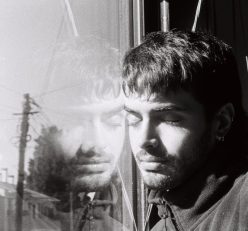When I first left my country in 2018 I had bad connections with it. I wanted both emotional and physical relations linked to my country to disappear completely. I didn’t even want people to recognize me as apart of my country. I didn’t felt Portuguese. I didn’t want to be it. I wanted a fresh start as someone with no roots. during those years, coming back home to Portugal was strange. All these ideas crossing my head like imperative guidelines for my existence and all the memories of places and people and family striking back at me in every street I recrossed. Whenever I went back to Madrid, people would ask – how’re things back there? How’s your family? How are your friends? I would always answer in an avoiding way: “It’s all good”. But, as soon as I started to note differences between my hometown and Madrid, I started to talk about Portugal more carefully – I would say “people talk differently in Porto”, “people act differently”, “people don’t do this in Portugal”. Little by little, I started to look at my country as a place that I esteem and care for. Little by little I looked at it as it was my responsibility and my duty to protect. Since then, everything looked different and I was no longer denying my identity.
However, I would look at Portugal as a place that it’s dying. Its people are disappearing. Its voice is becoming weak. As it always was in our history, people are fleeing to other places, looking for a better life. Now I feel that my duty, inside the capabilities of art, is to maintain our torch alive for more years. Therefore, I will expose one of those people that tried to inlight that torch.

Its name is Michel Giacometti, a french ethnologist that dedicated his life and work to Portuguese culture. When he was working in the Musée de L’homme, in the ’50s, he passed most of his time in the archives section. One day, he came across the underground Portuguese traditions, that most of the world didn’t know about and certainly was dying because of the impact of globalization. He fell in love immediately. He moved into the coast of Lisbon (Cascais) in 1959, in a country that was living one of the least talked dictatorships, with concentration camps, wars in Africa and India, prosecutions, oppressive police, and all everything else that a fascist influenced regime has. Michel went to the Calouste Gulbenkian Foundation to seek funding for his Trás-Os-Montes sound collection project. The investment was denied and the minister of propaganda now knew about him. He decided to do things on his own. In 1960, he founded the Portuguese sound archives and started recording material for Emissora Nacional (Portugal), Radio France, WDR (West Germany), and Sveriges Riskradio (Sweden). People started to notice his work and became very interested in the perception he had of Portuguese culture. By the end of the 1960s, he had the whole intellectual Portugal following him everywhere he went. In 1970, RTP (Rádio e Televesião Portuguesa – Portuguese Radio and Television) invited him to present his work on a program called “O Povo Que Canta” (the people who sing) for 4 years, where he showed the songs people would sing during their labor spontaneously.
For many, this wasn’t only recordings of the people singing while working, this was a political movement against Salazar’s dictatorship. Michel was telling the world how people lived in poor conditions, how the state was oppressive against them, how hopeless people sounded. Michel looked to these people as if they were carrying with them a superpower. That superpower was their voice, their arms, their shoes, their labor, their tears, their strength, and their resilience. Michel carried about these people as much he carried about the sound they were reproducing while working.

At the end of those 4 years with RTP, in 1974, the 25th of April happened, also known as the carnation revolution. It wasn’t because of Michel Giacometti certainly, but the echoes of his work most probably struck those who still had a small hope for freedom of speech. When I first saw myself with his legacy I felt the same. I felt a need to expand the voice of my people, their struggles, and their history. But I will always expose the toxicity that lies in many of them, that retrogrades Portugal and its progress. Nowadays, Portuguese fascism is reverberating again in a different form in our people. In 1930, it was called União Nacional (National Union) under the hands of António Oliveira Salazar. In 2020, it is called Chega and the voice is André Ventura.
